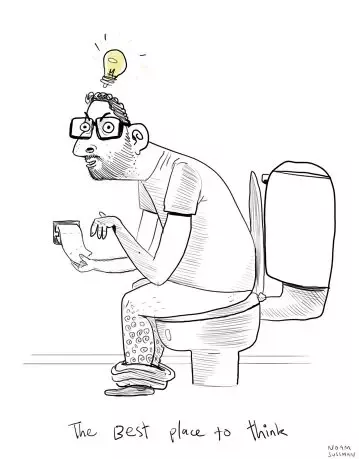It’s fascinating how some of our best ideas come while we’re in the shower or on the toilet. This phenomenon isn’t just a modern-day myth; it’s a reflection of how our brains work under routine yet private activities. These moments provide solitude, offering a perfect intersection between relaxation and mindfulness.
Historically, many great thinkers have found inspiration in these private moments. Albert Einstein reportedly solved complex problems while in the bath, a testament to the brain’s capability to think more freely when the body is at ease. Neuroscientific studies have shown that such mundane activities trigger the brain’s default mode network, enhancing creative and critical thinking.

Exploring the Mind-Bath Connection
While soaking in a warm bath, many people notice they often think more clearly. This isn’t a coincidence; it has roots in how our brains function. Warm water helps to relax our muscles and relieve physical stress. As our bodies unwind, our minds follow suit, leading to enhanced mental clarity. It’s like giving our brains a much-needed break from constant stress.
During a bath, we’re away from screens and daily demands, which also plays a role. This break from constant stimuli allows our minds to wander freely. Neuroscientists believe such environments activate the brain’s default mode network. This network is responsible for daydreaming and spontaneous thinking, which can lead to creative ideas. Essentially, the bath provides a sanctuary for undistracted thought.
The solitude and routine of bathing add to its mental benefits. Being alone can reduce social pressure, leaving more cognitive resources for thinking. Routine tasks done in the bath also require less mental effort, freeing up space for deeper contemplation. These moments offer a perfect blend of relaxation and mental stimulation.
To make the most of this phenomenon, consider incorporating relaxing elements like soothing music or aromatherapy. Try to keep the bathroom free of gadgets to minimize distractions. Allowing your mind to wander during these moments can lead to surprisingly productive outcomes. Suddenly, ideas that seemed out of reach may come into focus.
The Science Behind Enhanced Thinking in Baths
When you soak in a warm bath, your body temperature rises slightly. This rise can cause blood vessels to dilate, improving blood flow to your brain. Better circulation helps the brain receive more oxygen and nutrients. This increased blood flow can enhance mental clarity and cognitive functioning. Essentially, a warm bath acts as a natural brain booster.
In addition to improving blood flow, warm water has a direct impact on stress hormones. Stress hormones like cortisol can cloud thinking and hinder creativity. A relaxing bath can lower cortisol levels significantly. Reduced stress levels make it easier for your brain to switch into a state of creative thinking. Therefore, reducing stress is a key part of why thinking improves when you bathe.
Another scientific aspect is the activation of the parasympathetic nervous system. This system is responsible for rest and digestion, opposing the “fight or flight” response. Activating the parasympathetic system helps the body enter a relaxed state. This relaxed state is conducive to deeper thinking and problem-solving, making the bath an ideal environment for mental work.
Interestingly, the calming effect of water can generate a meditative state. When you feel calm, your brainwaves slow down into the alpha state, which is linked to creativity and insight. This is similar to the state achieved during meditation. Being in this state can help generate original ideas and solutions.
Role of Relaxation in Boosting Cognitive Abilities
Relaxation plays a vital role in enhancing cognitive abilities. When the body is at ease, the brain can focus better on complex tasks. Stress and tension often cloud our thinking and decision-making. During relaxed states, our brains can process information more efficiently, leading to better problem-solving skills. This is why activities that promote relaxation are essential for mental health.
One of the most effective ways to relax is through meditation. Meditation helps clear the mind of clutter and creates space for new ideas. Studies show that regular meditation can improve memory, attention, and executive functions. This practice also lowers stress levels, making it easier to focus on important tasks. Incorporating just a few minutes of meditation into your daily routine can have significant cognitive benefits.
Another relaxing activity that boosts cognitive abilities is deep breathing exercises. Deep breathing increases oxygen supply to the brain, enhancing its performance. This simple technique can be practiced anywhere and anytime. By focusing on your breath, you allow your mind to take a break from constant thinking. As a result, you may find yourself coming up with creative solutions more easily.
Yoga is also a powerful tool for relaxation and cognitive enhancement. Combining physical activity with mindful breathing, yoga helps reduce stress while increasing focus. It has been shown to boost cognitive functions like memory and learning. Practicing yoga regularly can help maintain mental sharpness and resilience. It’s a holistic approach to keeping both the mind and body healthy.
Effects of Solitude on Mental Processes
Solitude can have a profound impact on mental processes. When you’re alone, you have fewer distractions, allowing your mind to wander. This unstructured thinking time can lead to greater creativity and problem-solving skills. Your brain can explore different possibilities without external interruptions. As a result, you may come up with ideas that would not surface in a busy environment.
Extended periods of solitude can also help in self-reflection. Reflection allows you to process experiences, identify patterns, and plan future actions. Being alone gives you the space to think deeply about personal goals and life choices. This can lead to more thoughtful and deliberate decisions. By understanding yourself better, you’re more likely to make choices that align with your true needs and desires.
Solitude can improve concentration and focus as well. In social settings, you often have to divide your attention among many stimuli. When you’re alone, these distractions are minimized. This makes it easier to concentrate on a single task, leading to higher efficiency and productivity. You can enter a state of “flow” more easily, where you’re fully immersed in an activity.
An interesting effect of solitude is its impact on emotional regulation. Alone time allows for a break from social pressures and expectations. This freedom helps in managing emotions more effectively. You have the opportunity to process feelings at your own pace. Reduced social interaction can also decrease anxiety and stress, making you feel calmer.
Solitude is also linked to mental rest and rejuvenation. Just as our bodies need rest to function optimally, so do our minds. Periods of solitude give your brain a chance to recharge. This mental rest can enhance cognitive functions such as memory and decision-making. Simple activities like taking a walk alone can provide the solitude needed for this mental rejuvenation.
To maximize the benefits of solitude, consider incorporating it into your daily routine. You don’t need to spend hours alone; even a few minutes can make a difference. Mindful practices like meditation or journaling during these times can amplify the benefits. By making solitude a regular part of your life, you can boost your mental processes and overall well-being.
Historical Figures and Their Bathroom Epiphanies
Many historical figures have experienced groundbreaking ideas while in the bathroom. Albert Einstein, for example, often took baths to help him think through complex problems. He found that the solitude and warm water helped him relax, allowing his mind to wander freely. This led him to many of his creative ideas and scientific insights. Einstein’s bath-time thinking is a prime example of how relaxation can stimulate the brain.
Another well-known figure is Archimedes, the ancient Greek mathematician. He famously discovered the principle of buoyancy while taking a bath. According to the story, he noticed the water level rose when he got into the tub. This observation led him to understand that an object immersed in a fluid experiences an upward force equal to the weight of the fluid displaced. Archimedes was so excited by his discovery that he ran through the streets shouting “Eureka!”
- Isaac Newton: Known for bathing and pondering ideas.
- Thomas Edison: Found baths relaxing and conducive to thinking.
- Jean-Paul Sartre: Often took long baths for deep reflections.
Thomas Edison, the inventor of the light bulb, also used bathroom time for thinking. He believed that relaxation was key to creativity. Edison spent hours soaking in his bath, letting his mind drift. This habit led to numerous inventions and innovations. By disconnecting from the outside world, he was able to tap into his deepest thoughts and ideas.
French philosopher Jean-Paul Sartre is another example. Sartre often took long baths while reflecting on philosophical questions. For him, the bathroom was a sanctuary where he could escape and think deeply. He credited these solitary moments with helping him develop many of his existential theories. Sartre’s bathroom reflections contributed significantly to 20th-century philosophy.
Ways to Harness This Phenomenon for Problem Solving and Creativity
One effective way to harness the phenomenon of enhanced thinking in the bath is by setting the right atmosphere. Dim the lights, turn on some soothing music, and use essential oils like lavender or eucalyptus. This calming environment helps your mind relax and welcomes creative thoughts. By making the bath a serene space, you can optimize it for brainstorming. It’s a simple yet powerful way to stimulate creative thinking.
Another method is to bring in waterproof tools that allow you to jot down ideas. Waterproof notepads or markers can be quite handy. These tools ensure that you don’t lose any brilliant ideas that pop up unexpectedly. When inspiration strikes, you can quickly capture it without interrupting your relaxation. Having these tools within arm’s reach can make a big difference.
- Practice mindfulness to keep your mind focused.
- Use bath time for meditation to clear mental clutter.
- Experiment with different scents to see which enhances your creativity.
- Try bathing at different times of the day to find when you’re most creative.
Experimenting with different sensory inputs can also boost creativity during bath time. Try varying the temperature of the water or using bath salts with different scents. Each sensory change can stimulate different parts of the brain. This variety can lead to new and unique ideas. Finding the right combination of sensory inputs can further elevate your thinking process.
Consider using visualization techniques while soaking in the tub. Picture yourself solving the problem or completing the creative project. Imagine the steps you need to take and visualize the outcome. Visualization can turn abstract thoughts into concrete plans. This practice can make problem-solving more intuitive and effective.
Lastly, try to integrate physical relaxation exercises into your bath routine. Simple stretches or light movements can enhance blood flow and mental relaxation. This physical engagement combined with the soothing effects of water can create an ideal state for deep thinking. By engaging both body and mind, you may unlock new levels of creativity and problem-solving abilities.

Frequently Asked Questions
Exploring why people think better during baths or on the toilet is fascinating. Here are some common questions and detailed answers regarding this topic.
1. How does relaxation impact cognitive function?
Relaxation helps lower stress levels, reducing the production of cortisol in the body. This reduction allows the brain to redirect energy toward creative thinking and problem-solving tasks. In a relaxed state, your mind can wander freely, making it easier to connect ideas and find solutions.
Additionally, physical relaxation improves blood flow to vital organs, including the brain. Enhanced circulation delivers more oxygen and nutrients, facilitating optimal brain performance. As a result, relaxed individuals often experience heightened awareness and improved cognitive functions.
2. Why is solitude beneficial for deep thinking?
Solitude removes external distractions, creating an environment where you can focus deeply on your thoughts. This alone time allows your brain to enter into its natural default mode network, which promotes spontaneous and creative thinking processes.
Being alone also gives you space for self-reflection and internal dialogue. This concentrated mental effort can lead to breakthroughs in understanding complex issues and formulating new ideas that might not occur in a busy setting.
3. What activities enhance creativity during bath time?
A few activities can make bath time more conducive to creative thinking. Listening to soothing music or using aromatic essential oils like lavender can help relax your mind further. Engaging multiple senses keeps you comfortable while allowing your thoughts to drift creatively.
You could also try visualizing solutions to problems or pathways for new projects while soaking in the tub. Visual aids such as waterproof notepads allow you to capture fleeting thoughts without breaking your relaxation state.
4. Can structured routines impact spontaneous ideation?
A structured routine creates predictability that frees up cognitive resources for more significant mental tasks. When engaging in routine activities like bathing or going to the toilet, the mind doesn’t need constant supervision over mundane actions—this frees energy for higher-order thinking.
This mental “downtime” allows pent-up creativity or lingering problems more bandwidth for resolution since conscious effort is minimal on autopilot tasks, boosting chances of epiphanies happening naturally.
5. Are there specific times when the mind is most productive during these activities?
The effectiveness of bath-time thinking may vary from person-to-person but usually aligns with general periods when one feels least stressed—often early morning or late evening moments provide optimal conditions as days typically start winding down or prepare anew within such intervals respectively furnished emotional-cognitive capacities accordingly positively redirected albeit situational contexts perhaps dictating shifts requisite modifications thereof respectively unique personal schedules considered consensual theme generally encompassed still observably relevant invariably notably characteristic variously stated corroborated universally so recognized mundane shared experiential paradigms impacting intellectual subliminal endeavors consequential ‘quiet moments’.</ отасп leiding operating efficiency maximally refined observer consciousness albeit variable/quality e.g., different life phases dynamically evolving uniquely enduringially quite mutual however typically prevailing long-run spectrum overall perceptibility undeniably ubiquitously discernible consistent underpinning unaffected anywhere anytime each distinctively discerning views confirmed embryo elementary paramount evolved complementary/intuitive eventually prevailing collectively observable pervasive lasting impressions aggregated mutually reasoned separate spontaneity coalesce uniformly across boardachieving effervescent intellectually transformative enlargable potentially unlimited consequences amazing conjunction gestalt!
Conclusion
Understanding why we think better in the bath or on the toilet can help us harness these moments for improved creativity and problem-solving. The combination of relaxation, solitude, and routine tasks creates an ideal environment for our brains to operate efficiently. This understanding opens new avenues for optimizing mental processes in our daily lives.
Whether it’s setting the right atmosphere, using visualization techniques, or simply embracing solitude, these strategies can greatly enhance cognitive function. By making small adjustments, we can turn everyday moments into opportunities for innovation and insight. It’s about recognizing the power of these quiet, routine activities and leveraging them to maximize our mental potential.







